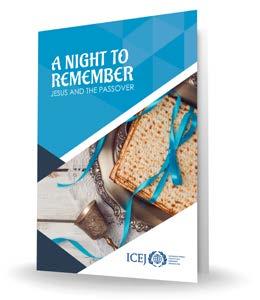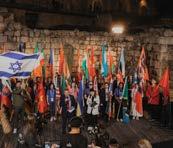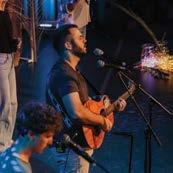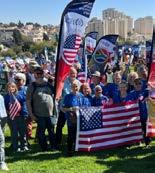
WHY PURIM MATTERS FOR CHRISTIANS (PAGE 6)


WHY PURIM MATTERS FOR CHRISTIANS (PAGE 6)
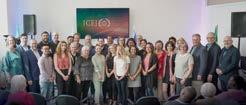

The International Christian Embassy Jerusalem was established in1980 in recognition of the biblical significance of all of Jerusalem and its unique connection to the Jewish people. Today the ICEJ represents millions of Christians, churches, and denominations to the nation and people of Israel. We recognize in the restoration of Israel the faithfulness of God to keep His ancient covenant with the Jewish people. Our main objectives are:
• To stand with Israel in support and friendship
• To equip and teach the worldwide church regarding God’s purposes with Israel and the nations of the Middle East
• To be an active voice of reconciliation between Jews, Christians, and Arabs, and to support the churches and congregations in the Holy Land
From its head offices in Jerusalem, the ICEJ reaches out into more than 170 countries worldwide, with branch offices in over 90 nations.
Our vision is:
• To reach every segment of Israel’s society with a Christian testimony of comfort and love
• To reach and actively represent to Israel the support of denominations, churches, and believers from every nation on Earth
The Christian Embassy is a non-denominational faith-based ministry supported by the voluntary contributions of our partners and friends across the globe. We invite you to join with us as we minister to Israel and the Jewish people worldwide by donating to the ongoing work and witness of the ICEJ.
WORD FROM JERUSALEM
ICEJ President Dr. Juergen Buehler
USA President Susan Michael
VP International Affairs Dr. Mojmir Kallus
VP Finance David van der Walt
VP Operations Barry R. Denison
Senior VP & International Spokesman David Parsons
VP AID & Aliyah Nicole Yoder
Managing Editor/Publications Director Laurina Driesse
USA Managing Editor Karen Engle
Staff Writer Anastasiya Gooding
Graphic Design/Illustrators Ryan Tsuen, Nancy Schimp
Photography Adobe Stock, Adobe Firefly, Shutterstock, AP, Flash90, JAFI, Dorron Kline-Telfed, iStock, JAFI, Annie Splatt on UnSplash, Operation Lifeshield,Wikimedia, Wordpress, Teresa Craig, ICEJ Staff and Branches
The New King James Bible is used for all Bible references unless otherwise noted.
Word From Jerusalem is published by the International Christian Embassy Jerusalem. Reproduction in whole or in part without written permission is prohibited. Word From Jerusalem has no subscription price and is supported through contributions worldwide. The ICEJ USA Branch is a 501(c)(3) non-profit organization with offices in Tennessee, Florida, and Washington, DC. All gifts to this ministry are tax-deductible according to United States law.
INTERNATIONAL CHRISTIAN EMBASSY JERUSALEM - USA
Support our ministry online at: www.icejusa.org

Dear Friends,
After 17 months of intense fighting, Israel is emerging victorious in several key areas of their multifront war triggered by Hamas terrorists on October 7, 2023. And though the release of alive hostages in recent weeks brings us and all of Israel great joy, as we learn details of their time in captivity, our hearts are weighted knowing there are other hostages still in Gaza in such deplorable conditions.
As we pray for healing for the freed hostages and the release of those still captive, we press on with the work God has called us to do through the ICEJ as commanded through Isaiah—to “Comfort, yes comfort My people” (Isaiah 40:1). We are undoubtedly in a time in history like no other—and gentiles have a specific role to play in fulfilling this Isaiah 40:1 mandate.
In this issue, you’ll find articles sharing practical ways the ICEJ is doing this with your help—from assisting traumatized Israelis from Kibbutz Nir Oz to rebuild and heal, boosting civilian resilience by training Israelis returning to the North and coming along new immigrants in finding their footing through a uniquely successful housing initiative.
You’ll also read a fascinating teaching on how Passover and the Exodus story relate to Jesus’ second coming, as well as a teaching article on why understanding the feast of Purim matters for Christians. I encourage you to read them both.
Our daily Global Prayer Gatherings continue to be times of worship, refreshment, and deep teaching. Join us every day at 9:30 a.m. (ET) or when you can at: www.icejusa.org/ globalprayer.
Many blessings from Jerusalem,

David R. Parsons
Senior
Vice President
& Spokesman International Christian Embassy Jerusalem
COVER PHOTO: A cup of wine, items on a seder plate, and matzah used in a traditional seder celebration to remember God's hand in the Jewish people's departure from Egypt for the promised land. (Photo credit: Shutterstock)
FOR MAGAZINE ARCHIVES
visit www.icejusa.org/wfj



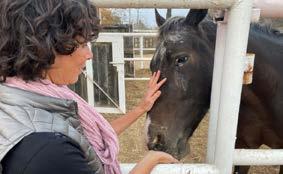

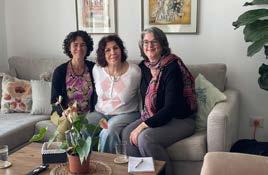
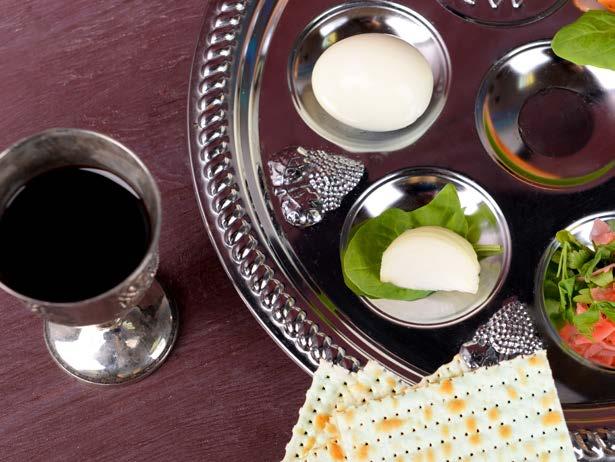
BY DAVID R. PARSONS, ICEJ SENIOR VICE PRESIDENT & SPOKESMAN
As we look forward to the observance of Passover, this year beginning on April 12 and ending on Saturday, April 19, it is enlightening and comforting to reflect not only on God’s mighty deliverance of the Israelites from Egypt some 3,500 years ago but also on the great prophetic significance of this historic event. Most Christians are familiar with how that first Passover casts a long shadow forward to the first coming of Jesus and His redemptive work on the cross. However, according to the Hebrew prophets and the New Testament, the Exodus story also serves as a prophetic guide for the end of the age and Jesus’ Second Coming.
Jesus, Our Passover Lamb
Much could be said about the parallels between the Jewish holiday of Passover and the Christian celebration of Easter, or what I prefer to call “Resurrection Sunday.”
In the most basic terms, the physical deliverance of Israel from the bondage of slavery in Egypt was a foreshadowing of the spiritual deliverance we have in Christ, whose atoning death has set us free from the bondage of sin (Romans 6:17–18; Galatians 5:1; Colossians 1:13–14).
Just as God spared the Israelites from the “destroyer” when He saw the blood of a lamb sprinkled on their doorposts, the shed blood of Jesus the Messiah allows God to “pass over” our sins completely (Romans 3:25; 1 Corinthians 5:7).
Moses and Jesus
The central figure of the Passover story is Moses, who was the Deliverer promised beforehand by God to free the Hebrew children from bondage in Egypt (Genesis 15:13–14). Likewise, Yeshua (Jesus) was a promised deliverer anticipated by His people (Daniel 9:24–26; Micah 5:2; Matthew 1:21; 2:4–6; Galatians 4:4).
Indeed, the many parallels between Moses and Jesus are quite remarkable, including that both would suffer rejection by their own people (Numbers 14:22; Deuteronomy 18:15; Acts 3:14–18; 7:38–39).
The Last Supper, which Jesus held with His disciples, was undoubtedly modeled on a Passover seder meal. When Jesus came to the traditional third cup of wine at Passover (Pesach in Hebrew)—the cup of redemption— He stated: “This cup is the new covenant in My blood, which is shed for you” (Exodus 6:6; Luke 22:20)
Just as the baked matzah (unleavened bread) of Passover has small holes and stripes, the body of Jesus was pierced for our transgressions and His back bore stripes for our healing (Psalm 22:16; Isaiah 53:5; Matthew 27:26; John 19:31–37).
And just as Israel was commanded to observe the Passover meal every

year in remembrance of their Exodus from Egypt, Jesus told His disciples to continually partake of the bread and wine of the Last Supper in remembrance of what He was about to suffer for their sake (1 Corinthians 11:25).
Other details in the Gospels clearly demonstrate how closely Jesus resembled the sacrificial lamb of Passover tradition. He was thoroughly examined for flaws by the Jewish priests and even the Roman authorities. He died on a cross right as the last Passover lambs were being slaughtered in the temple courts. None of His bones were broken (Exodus 12:9; Psalm 34:20; John 19:33–36).
So we find that great prophetic and redemptive purposes, which lay hidden in the original Passover experience, were openly fulfilled during that fateful Passover at the first coming of Jesus some 2,000 years ago. But how does the Exodus story relate to his Second Coming?
Interestingly, the Bible also draws a clear analogy between the Israelite departure from Egypt and God’s dealings with Israel and the gentile
nations at the end of the age. For instance, Jeremiah said the last-days return of Israel to the land will mirror the Exodus and even exceed it in magnitude.
“Therefore behold, the days are coming,” says the Lord, “that it shall no more be said, ‘The Lord lives who brought up the children of Israel from the land of Egypt,’ but, ‘The Lord lives who brought up the children of Israel from the land of the north and from all the lands where He had driven them.’ For I will bring them back into their land which I gave to their fathers.” (Jeremiah 16:14–15)
This same parallel is found again in Jeremiah 23:7–8, where the context once more is the final ingathering of the Jewish people to their ancient homeland. Here, it has the added element that the promised “Branch,” or Messiah, will come on the scene at this time to gloriously reign, such that “Judah will be saved, and Israel will dwell safely” (Jeremiah 23:5–6).
Zechariah 10 carries a similar message, even adopting clear imagery from the parting of the Red Sea to describe this future time when Jews would depart from the gentile nations and journey home to the Land of Israel: “He shall pass through the sea with affliction, and strike the waves of the sea: all the depths of the River shall dry up” (Zechariah 10:11).
Elsewhere, the prophet Micah foresees a time when Israel is finally
restored to her land and to her God, even while He is dealing with the nations in an Exodus-like scenario, saying: “As in the days when you came out of the land of Egypt, I will show them wonders” (Micah 7:15). The prophet also sees the Lord “passing over” the transgressions of the remnant of His people—employing the same Hebrew word abar used in Exodus 12:23 to describe how the Lord would “pass through” the land to strike the Egyptians on the night of the Passover.
Now over the past century or so, we have witnessed the incredible return of the Jewish people from the many lands of their dispersion and captivity, just as the Hebrew children were freed to leave Egypt and start out for the promised land. But we have yet to see the mighty hand of God truly humbling the nations for harshly mistreating the people of Israel, like He did with Pharaoh and his army at the crossing of the Red Sea. Yet that day is surely coming.
Consider that many judgments foretold in Revelation closely parallel the plagues that struck Egypt. Five of the ten plagues described in the book of Exodus are also found in Revelation, including hail mingled with fire (Revelation 8:7); the seas and rivers turned to blood (8:8; 16:3–4); locusts (9:1–11); loathsome sores like boils (16:2); and darkness (16:10–11).
In addition, the two witnesses who show up in Revelation 11 have powers much like Moses (and Elijah) to call down fire from heaven, stop the rains, turn water to blood, and “strike the earth with all plagues, as often as they desire” (Revelation 11:5–6). One school of thought maintains that just as Moses called forth every plague on Egypt amid Pharaoh’s court, these two anointed figures will be in Jerusalem calling down all the judgments occurring over the three-and-a-half-year period described in Revelation 6–9. This view is supported by verse 10, which states that the whole world will rejoice over their death because “these two prophets tormented those who dwell on the earth.”
God’s judgment of the nations in the last days is often described by the Hebrew prophets as culminating in Jerusalem, such as in Joel 3:1–3. It is as if the nations have released the Jewish people to go back home but then have second thoughts and pursue them there, like Pharaoh did of old. In Zechariah 14, the prophet also speaks of that day when God will gather all nations to Jerusalem for judgment. Although the city sees great destruction, the Lord Himself will appear on the scene and “fight against those nations, as He fights in the day of battle” (Zechariah 14:3).
The prophet then describes the Lord standing with his feet on the Mount of Olives, which miraculously splits in half to open a pathway of escape for the people of Israel (Zechariah 14:4–5). This prophesied event bears such an uncanny resemblance to the parting of the Red Sea that we must conclude it is yet one more example in the Bible of Exodus analogy connected to the end of days.
It is one thing for waters to part to allow a people to flee and then come back together to drown the pursuing enemy. How much greater a wonder to behold will be the parting of a mountain to deliver His people just when the nations are closing in on Jerusalem! Indeed, the modern-day Exodus is far from over, and its end will be more awesome than that first Exodus long ago—yea, more awesome than we can even imagine.
Truly, “the Lord lives!”—the very Lord who died on a cross at Passover that we might live with Him forever.


Purim is a joyous festival the Jewish people celebrate to this day (this year from March 13–14) initiated in the story of Esther in the Bible. It’s not a biblically commanded feast like those laid out in Leviticus 23, yet the background of Purim offers valuable information about God’s plan for Israel and, ultimately, the world.
BY KAREN ENGLE, ICEJ MANAGING EDITOR
T hrough this historically accurate book and its star protagonist—a young Jewish woman who found herself in a place of favor with the king of Persia—we see the roots of hatred toward the Jewish people. But we also see evidence of God’s sovereignty in action behind the scenes as He protected them from annihilation—not unlike what we are witnessing today as Israel fights for her very existence.
T herefore, it’s a Jewish holiday with great relevance for Christians today.
would have been annihilated.
At her uncle Mordecai’s request, and after his reminder that if she remained silent “relief and deliverance will arise for the Jews from another place and you and your father’s house will perish” (4:14), Esther approached the king. She could have remained quiet (coming before the king risked the penalty of death), but instead, she successfully petitioned to have Haman’s wicked plans stopped, which led to his death on the very gallows he had prepared for the Jews. Even more profound, the king allowed the Jews to enact revenge on their enemies.
HAD HAMAN BEEN SUCCESSFUL, VIRTUALLY ALL THE JEWISH PEOPLE ALIVE AT THE TIME WOULD HAVE BEEN ANNIHILATED.
The Story of Esther Centuries before Esther was born, the Assyrians and then the Babylonians had dispersed the people of Israel and Judah throughout the Near East. Eventually the Persians absorbed most of those lands into their empire, which reached its greatest extent in Esther’s day. At the time, the Jews were a religious minority living in Persia with no king, army, or land.
King Ahasuerus (Xerxes) chose Esther, a young, beautiful, Jewish girl, as his queen after divorcing his wife, Vashti, for insubordination. Esther 2:17 says: “The king loved Esther more than all the women, and she found favor and kindness with him.”
Though Esther managed to hide her Jewish identity from the king (the Jews had many foes), an enemy rose with an evil scheme to exterminate all Jews throughout the Persian Empire: Haman, the king’s newly appointed high officer. When Esther’s uncle, Mordecai, refused to bow to him, Haman determined to destroy the Jews and drew lots (in Hebrew pur, from where “Purim” is drawn) to determine which day Mordecai and his people would be exterminated: Adar 13 (our February-March). Had Haman been successful, virtually all the Jewish people alive at the time
Indeed, God was at work behind the scenes causing what ICEJ President Juergen Buehler calls the “great turnaround” that protected His people.
Foreshadowing Things to Come Esther’s actions saved the entire Jewish nation from utter destruction. But her story also reflects where the world’s demonic hatred toward the Jewish people stems from. Consider Haman’s accusatory words about God’s people in his attempt to rid the empire of Jews:
There is a certain people scattered and dispersed among the people in all the provinces of your kingdom; their laws are different from all other people’s, and they do not keep the king’s laws. Therefore, it is not fitting for the king to let them remain. (Esther 3:8)
This diabolical force of accusation is at the root of antisemitism then and today, writes Buehler:
It is what drove Martin Luther to write his notorious pamphlet On the Jews and Their Lies. It made the Nazi officials at the Wannsee conference, although many were raised in Christian homes, to agree to the “Final Solution”: the plan to murder 11 million Jews in Europe and North Africa. And it causes the writers of Palestinian schoolbooks to deny any Jewish history
or right to live in the Land of Israel, thereby raising yet another generation of antisemitic Palestinian youth—including those who stormed the Israeli communities along the Gaza border on October 7, 2023.
Throughout the nation of Israel’s history, whether the Jewish people were in or out of the promised land, they fell subject to Haman-like rulers who repeatedly planned their destruction for no other reason than they were Jewish. Haman sought to “to destroy, to kill, and to annihilate all the Jews, both young and old, little children and women, in one day” (Esther 3:13). His words are echoed by a current villain bent on wiping out the Jewish people: Hamas in Gaza, a proxy of one of Israel’s greatest enemies throughout history, Iran.
This deep hatred of God’s people was evident in the atrocities that occurred on October 7, 2023, when Hamas militants invaded southern Israel, massacring more than 1,200 people, and in the worldwide protests that followed. It’s a demonic hatred that, on the surface, is against the Jewish people, but ultimately, against the God of the universe who created them to bring glory to His name. The prophet Samuel wrote:
Who is like Your people, like Israel, the one nation on the earth whom God went to redeem for Himself as a people, to make for Himself a name—and to do for Yourself great and awesome deeds for Your land—before Your people whom You redeemed for Yourself from Egypt, the nations, and their gods? (2 Samuel 23:7)

Throughout millennia of near extinction, God has been in the shadows watching over His people Israel, for indeed “He who keeps Israel shall neither slumber nor sleep” (Psalm 121:4). He is faithful and will keep His promise to bless the entire world through the nation of Israel (Genesis 12:3). If He doesn’t, He would be made out to be a liar—and that is not who God is. His very name is faithful, and through the nation of Israel, He will make that name known to the entire world.
What’s happening to Jewish people today in Israel and worldwide is a modern-day picture of this relationship between God and the Jews. Though it seems the entire world is against the Jewish people and the nation of Israel, God is not. God preserved His people in Esther’s day, and He will continue to hold them through any persecution or hatred they experience now or in the future—even if some do not recognize His mighty hand at work in preserving them. Just as Isaiah wrote, Israel shall never cease to be a nation:
“For as the new heavens and the new earth which I will make shall remain before Me,” says the Lord, “So shall your descendants and your name remain.” (66:22; see also Jeremiah 31:36)
The psalmist wrote that the “Lord is in His holy temple, the Lord’s throne is in heaven” (11:4). The Jewish people’s existence today confirms this verse: God is sovereign, and Jesus, the King of the Jews and of the nations, is on the throne. And through the turn of events in Esther, we see that indeed, all things and people move according to His plan and purpose.



BY REV. DR. TYSON LAMBERTSON, ICEJ USA DIRECTOR OF OUTREACH
Last month, I was privileged to attend the International Christian Embassy of Jerusalem’s Envision Pastors and Leaders Conference in Israel. Surrounded by church leaders from across the world, I was deeply impacted by the wisdom and conviction of those who spoke. It was a powerful experience—one that left me with a single, urgent thought: I wish every Christian could have been there to hear what I heard.
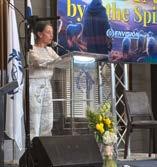
One of the most moving moments of the conference was hearing from Rachel Goldberg-Polin, the mother of Hersh Goldberg-Polin. Hersh was just 23 years old when he attended the Nova music festival on October 7, 2023—a day that would become one of the darkest in Israel’s modern history. That morning, Hamas terrorists launched a brutal attack, massacring 1,200 innocent people and taking over 250 hostages. Hersh was among them.
For almost 11 months, his fate remained unknown—until August 21, 2024, when his body was recovered from the Gaza Strip.
Rachel stood before a room full of pastors and leaders, sharing her grief, her pain, and her unyielding hope. As she spoke, I was struck not only by the deep sorrow in her eyes but also by the strength radiating from her soul. Before she even opened her mouth, I had seen her worshiping in the conference gathering. The heaviness in her spirit was evident, but there was also a supernatural grace surrounding her—the kind of strength that only comes from knowing God is “near to the brokenhearted” (Psalm 34:18 ESV).
Rachel’s voice wasn’t just a mother’s lament. It was a call to action. And while I don’t remember every word she said, I will never forget her passion.
For many believers, Israel can feel like a distant political issue—something for governments to handle, not the church. But standing with Israel is not about politics—it’s about Jesus.
Jesus was born in Israel. He walked its land, taught in its synagogues, and wept over Jerusalem. He was crucified, buried, and resurrected in this land, and He will one day return to reign from Jerusalem. As followers of Christ, we are spiritually grafted into God’s covenant with Israel (Romans 11:17–18), and we have a responsibility to love what He loves.
The Bible makes it abundantly clear:
• God’s covenant with Israel is eternal: “I will bless those who bless you, and whoever curses you I will curse.” (Genesis 12:3 NIV)
• Jesus Himself wept over Jerusalem: “O Jerusalem, Jerusalem ... how often I have longed to gather your children together, as a hen gathers her chicks under her wings, and you were not willing.” (Matthew 23:37 NIV)
• We are called to pray for Israel: “Pray for the peace of Jerusalem: May those who love you be secure.” (Psalm 122:6 NIV)
Right now, Israel is facing one of its greatest challenges in modern history. Innocent people have been murdered. Families remain torn apart as hostages are still held in captivity. Meanwhile, antisemitism is spreading across the globe, and many in the world—including some Christians—are turning their backs on Israel when she needs us the most. But Jesus has not turned His back on Israel, and neither should we.
Pray Like Jesus for Israel
Jesus wept for Jerusalem—let’s follow His example. Ask God for peace, protection, justice, and pray that the people of Israel will encounter their God in a fresh way
Be a Voice for Truth
The world is watching. Take a stand against antisemitism and false narratives by sharing the truth about Israel in your church, community, and online.
Send a Pastor—Influence a Church
Through our Pastors Education Fund, you can send a pastor to Israel and transform an entire congregation. Seeing the land deepens their preaching and leadership. Invest in a leader—and watch a church grow.
Walk the Land, Ignite Your Faith
There’s no substitute for experiencing Israel firsthand. Join us for one of these powerful gatherings in Israel:
• 2025 Feast Tour (Oct. 6–15, 2025) – Celebrate the Feast of Tabernacles in Jerusalem.
• USA Serve Tour (Nov. 3–14, 2025) – An 11-day service tour to bless and support the people of Israel through hands-on projects and meaningful connections. Serve, experience, and stand with Israel.
• Pastors & Leaders Envision Conference (Jan. 28–Feb 6, 2026) – Gain insight and vision for leading your church to support Israel.
Be the Hands and Feet of Jesus
Support ICEJ humanitarian aid projects making a real impact in the land. (Matthew 25:40)
Encourage Your Pastor to Attend a Pastors' Gathering
Connect with like-minded believers in your region and deepen your understanding of Israel:
March 20 | Fort Collins, CO – House of Prayer, 10:00 a.m.–1:00 p.m.
June 19 | Lynden, WA – North County Christ the King Church, 10:00 a.m.–1:00 p.m.
October 10 | Anaheim, CA – The Rock, 10:00 a.m.–1:00 p.m.
Rachel Goldberg-Polin’s passion burned in that conference room at Envision, and it burned into my heart. We are living in a defining moment of history for the church, and we cannot afford to be passive. Jesus is returning to Jerusalem one day—will we be found faithful in standing with His people?
Let us stand with Israel. Let us pray, speak, act, and go—until justice is done, peace is restored, and the world sees that God’s promises to Israel remain unshakable.

NANCY FAGER SCHIMP Communications Coordinator
Much of the design work at ICEJ USA, including the Word From Jerusalem magazine, books from Embassy Publishers, and other design projects, is created by Nancy Schimp, our Communications Coordinator.
Nancy has been with the ICEJ USA since 1991, but her love for Israel began in 1978 when she toured the country with a 10-member singing group for two months. “That summer, I found a calling and a love for the country of Israel and its people,” Nancy shares. Throughout her college years, she longed to return to Israel, and in 1981, that longing became a reality. During that tour, she attended an ICEJ Feast of Tabernacles celebration, followed by three more trips to the land.
In 1991, an opportunity arose for Nancy to work with the ICEJ in Jerusalem, where she assisted the financial director, Tim King, with the organization’s international branch offices and helped coordinate various receptions and events hosted by the Jerusalem office. After five years, she moved to Washington, DC, to support ICEJ USA’s current president, Susan Michael, in developing the USA Branch—and she has worked for ICEJ USA ever since.
“The Bible comes alive when you visit Israel,” says Nancy. “I see the Jewish people as keepers of God’s Word, and He has brought them back to the land just as He said He would. It is exciting to see God working in modern times."
Nancy married her husband, a widower with eight children, in 2012 and took on the role of a wife and mom. “I believe the Lord knows the innermost parts of your heart and mind,” she said. “He is faithful in His timing to respond to those desires. For many years I longed to have grandchildren, and in June of 2024, I became a grandmother to two beautiful baby boys.”
When not spending time with her kids or grandsons, she enjoys sitting on the back of her husband’s touring motorcycle, walking her dog, going out for coffee with friends and family, playing golf, reading, and Bible study. One of her favorite verses is Psalm 37:4: “Take delight in the Lord, and He will give you the desires of your heart.”

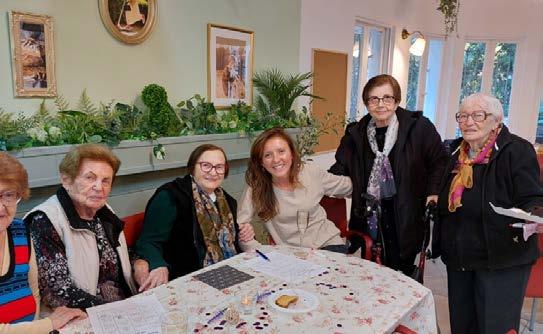
BY YUDIT SETZ, ICEJ DEPUTY AID DIRECTOR
In recent months, the ICEJ’s Home for Holocaust Survivors in Haifa bid farewell to three of our dear long-term residents who passed away while welcoming a new resident with a moving story of surviving World War II.
The three residents passed at the blessed ages of almost 101, 96, and 94. We are grateful to have known and cared for them until their last days.
There are still some 130,000 Holocaust Survivors alive in Israel. While this number is dwindling each year, far too many Survivors still need a place like our loving community.
One of the new residents we have taken in is Alexander, 86, who made Aliyah two years ago from war-torn Ukraine.
“I am so excited to be able to move into your community,” he exclaimed. “People have been so kind to me; see all the furniture I received!”

He also proudly showed off his new teeth, which he received for free as a Holocaust Survivor here in Israel. Alexander is glad he remains healthy, enjoys learning Hebrew, and finally has enough food and medicine—and everything else he needs.
Born in Odesa in 1939, Alexander fled with his mother and siblings to the east as the Nazis invaded Ukraine in August 1941. They ended up walking 75 miles to his grandmother’s home in Nikolaev, avoiding German bombings along the way. His grandmother hid the children in a small basement with an earthen floor. Groundlevel windows allowed them an occasional peek outside and a breath of fresh air, but only at night to avoid detection.
Alexander recalls the place being damp with mice scurrying around and biting them, making them cry. He developed rheumatism, and his ribs protruded from malnutrition. In post-war photographs, he looked like skin and bones. After the war, he became an engineer and had two sons. Now, he is under our care.
Recently, we decided to turn one of our new rooms into a wellness center, with a hairdresser station, a place for manicures and pedicures, a
massage bed and massage chair, and a nurse station. This will be a great place to care for the bodies and souls of our elderly residents.
Sixteen residents arrived at the Haifa Home from Ukraine in recent years, and we have been keen to strengthen their Jewish roots in the Land through Hebrew and Israeli heritage lessons. Learning a new language at an advanced age is difficult, but Maria from our Christian volunteer team took on the challenge of teaching them Hebrew. Recently, a class of five finished their first level—Kita Alef—so we had to celebrate!
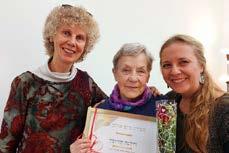
Haifa Home resident Violette with her graduation certificate next to ICEJ Deputy AID Director Yudit Setz (left) and Maria Grinfeld (right), ICEJ Haifa Home coordinator for Russianspeaking residents in the Haifa Home
The students, who had been teachers and engineers themselves, were a little nervous, but they all finished well. They received a graduation certificate with a rose, while we gave Maria an Award of Excellence for her amazing work.
Many of our residents enjoy spending time together rather than watching TV at home. Thus, we grab every opportunity for community activities.
Christine, our resident nurse from Germany, organizes Bingo and chess for the residents
every week. She was recently married, and we decided beforehand to throw a surprise bridal shower for her with the female residents. We managed to catch her completely by surprise during the Bingo games. Besides playing Wedding Bingo, we asked the Survivors to share their most important marriage advice with Christine. All the ladies had been married for many years and shared much wisdom.
The past year was difficult for our residents and Israel in general, but we look forward to what 2025 will bring. We will keep serving our dear Survivors with the same determination and love and welcome new ones. We hope to finally receive the building permit to finish the third floor of our new building. With God’s help, we will continue to be your arms wrapping around these precious Holocaust Survivors as they walk out the last part of their life journeys




16-month calendar runs from September 2024 through December 2025. Astonishing photos from across Israel. Made in Israel.
responded to God’s call to go to the Land of Israel. $15.00 2025 PHOTO CALENDAR



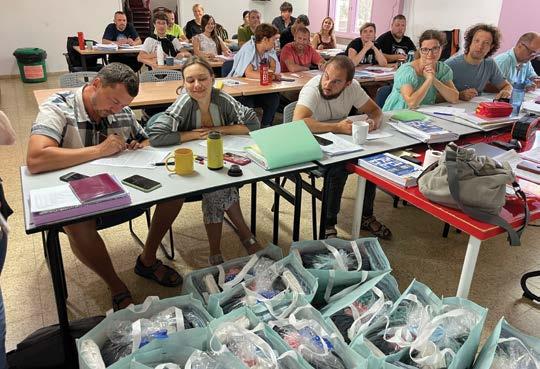
BY NATIVIA SAMUELSEN, ICEJ AID ADMINISTRATOR
he desire to build a future, even in the face of adversity, drives many to Israel.” This keen insight recently came from Jewish Agency for Israel (JAFI) chairman Doron Almog to explain why so many Jewish families are immigrating to Israel despite the ongoing conflict here. In fact, over 32,000 Jews made Aliyah last year even amid the intense fighting on multiple fronts.
With the support of the International Christian Embassy Jerusalem (ICEJ), more than 40 Jewish families are now getting their chance at a fresh start in Israel through the “First Home in the Homeland” program. The ICEJ is helping sponsor their new houses at Kibbutz Merchavia, where they will learn to speak Hebrew and integrate into Israeli society. This “First Home” program is a uniquely successful housing and absorption initiative that is offered in over 50 kibbutzim (intentional communities) throughout Israel.
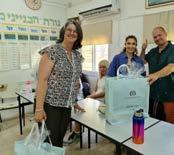
The program provides a structured framework for new immigrants to Israel to adapt to life in Israel. Over their initial 6–12 months in the Land, participants take intensive Hebrew courses and workshops on daily life and receive support in finding work. These steps are essential for families who have left behind homes, careers, and communities to come home to Israel.
“Many come from places that are very different from Israel, and it takes time to adjust and find their feet,” explained Nicole Yoder, ICEJ Vice President for AID & Aliyah, after a recent visit with the 40 newly arrived families supported by the Christian Embassy. “Coming to an established community that provides a home and full support for all the immigrants’ basic needs is a tremendous gift. We are thrilled to help make it possible.”
But the violence of October 7, 2023, tested the strength of the program in ways no one could have imagined. Families who had settled in villages near Gaza suddenly found themselves at the mercy of rockets and gangs of terrorists. One family, just weeks into their new life in Israel, was evacuated after the attacks, but their hearts never left the kibbutz. After months of uncertainty, they returned—determined to rebuild and give back to the community that embraced them.
“I remember receiving the first application of a family wanting to come to Israel after October 7, and then we received another, and another. It was so moving to see so many still eager to come,” said Valeria, a former participant who now helps coordinate JAFI’s “First Home” program. “Many of these new arrivals are doctors, scientists, and educators—and they all said the same thing: ‘We want to be there right now, to help.’”
Valeria’s story is a powerful example of the program’s impact. Five years ago, she left Eastern Europe with her husband and young son, driven by a desire to reconnect with her Jewish roots after searching her whole life for her identity. She also wanted to provide a brighter future for her family.
“I had everything back home, but something was missing,” she reflected. After years of searching, she finally found the missing piece in Israel. The program provided her with essential resources and a sense of belonging, helping her navigate the complexities of Israeli life. Now, Valeria uses her own experience to guide new arrivals.
“We planned to be here for six months to a year. That turned into five years, and now we think it will be for the rest of our lives,” she assured. “The most beautiful part of my job is watching the transformation. I see how children from Brazil begin speaking Hebrew and can communicate effortlessly with children from Eastern Europe. I watch families once afraid and uncertain of living in Israel grow into confident, thriving members of our community. They find jobs, build relationships, and begin their new lives.”
For families like the Dreimans from Ukraine, the journey began with fear and uncertainty but eventually became a hopeful new chapter. Alina, a professional painter, and Sasha, an investment businessman, along with their young daughter, fled war-torn Kharkiv. Through the program, they found not only a home on Kibbutz Merchavia but also a community eager to help them succeed. “It felt like people were waiting for us and that they love us,” Sasha shared.
“When I see these happy families, confident and thriving in their homeland, it reminds me why our work matters,” responded Valerie. As more immigrant families arrive in Israel, the need for continued support grows. Through the generous giving of our Christian friends worldwide, the ICEJ can sponsor more Jewish Olim (newcomers) in programs like “First Home in the Homeland” so these families can flourish and enjoy a safety net of support. It is more than finding a place to stay; they are finding a warm, welcoming community.
You can help provide housing, Hebrew language classes, and job training for new immigrants determined to rebuild their lives in Israel. Your support helps these families build their new lives in Israel. Join us in making a lasting impact.
BY NATIVIA SAMUELSEN, ICEJ AID ADMINISTRATOR
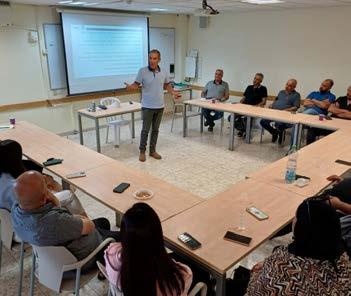
In the rolling hills near Israel’s border with Lebanon, local villages are eerily still, their streets almost deserted since residents evacuated their communities long ago. Schools and daycares are silent, collecting dust. Gardens are overgrown, and blackened patches of earth dot the landscape from the many recent fires sparked by rockets fired by Hezbollah. Despite the announcement of a ceasefire between Israel and the Lebanese terror militia a few months ago, few locals see reason to celebrate.
There remains an air of suspicion and unease, as many families are hesitant to come back to homes still within rocket range of Hezbollah fighters. These areas bore the brunt of more than a year of cross-border exchanges, forcing over 65,000 residents to hastily leave on October 8, 2023, when Hezbollah began launching daily attacks in support of Hamas down in Gaza.
In these difficult times, civil preparedness and

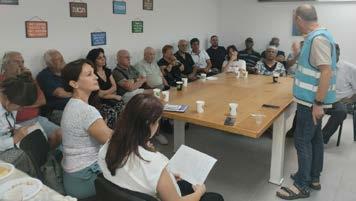
community resilience are crucial. Amid these challenges and seeing the need for swift action, the International Christian Embassy Jerusalem (ICEJ) engaged with a special project designed to boost civilian resilience among returning Israelis by providing essential tools and training that enabled four Community Emergency Teams (CETs) to prepare for an effective crisis response. Our donated equipment includes emergency vests, flashlights, communication devices, protective helmets, and first-aid kits. This support gives these communities the means to manage their safety protocols in the face of ongoing threats.
The Christian Embassy’s relief aid efforts in the North also include placing bomb shelters in vulnerable public places, supplying life-saving communication devices, and equipping emergency first responders with emergency medical kits. These initiatives ensure that residents can feel secure and will receive vital resources, creating an environment where communities are prepared and protected.
“The threat on Israel’s northern border with Lebanon is complex and evolving,” said Nicole Yoder, ICEJ Vice President for AID & Aliyah.
“Through the support of Christians around the world, we are working to strengthen Israelis living near the border to ensure they are not just surviving but standing strong.”
“I’m so proud of what we’ve accomplished,” added Megan Turner, a local coordinator of emergency services. “We really did make a difference for many of these northern communities, and we couldn’t have done it without the incredible support of the ICEJ.”
The combination of relentless missile attacks and possible mass terror invasions had fractured the sense of safety for these communities. However, our initiative with the local emergency teams is helping to rebuild that trust. So far, 63 emergency vests, 15 walkie-talkies, dozens of flashlights, and two generators have been distributed, along with 9 megaphones to improve communication during crises. The communities benefitting include Katzrin in the Golan Heights and Rosh Pina and Hatzor HaGalilit in the Hula Valley. In nearby Tuba Zangaria, our emergency equipment and training courses have turned civilian volunteers into self-assured first responders, ready for everything from medical emergencies to rocket alerts.
Before the Christian Embassy’s support came, these northern communities were without adequate emergency resources and felt vulnerable during crises. Now, thanks to the CET initiative, local teams are not only prepared for immediate threats but have developed a sense of confidence that bolsters community morale. The equipment and training have empowered the residents to take action, allowing them to return home and rebuild their lives.
The ICEJ’s support for this civil preparedness project has reached into communities with historically limited emergency infrastructure. For instance, Tuba Zangaria is a predominantly Arab village, and our program has allowed the training of even youth-led response teams. “Unfortunately, this village was heavily hit during the recent escalation in fighting, and the CETs were activated more than once,” explained Megan. “But because they had already
been training together and were known in the community and among the various rescue teams, they were able to deploy and provide vital support such as directing traffic, closing roads, and making house calls in areas where rockets and shrapnel fell.
“These groups are continuing to work together, even beyond the emergency situation, in order to create more community involvement among village residents, thus making the village stronger and more resilient, for both emergency and routine times,” she added.
The influence of the CETs extends beyond the crisis caused by the war with Hezbollah. These northern communities are already using their training and equipment to respond to car accidents and medical incidents, efforts that not only save lives but also foster trust and cooperation among the diverse residents of the area.
“ICEJ is an incredible friend and partner,” insisted Megan. “I can’t wait to give you some more updates on this project.”
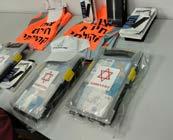
The Christian Embassy’s joint efforts with local Israeli authorities have strengthened bonds between neighbors, encouraging a collective resilience that inspires families to return home with newfound trust in their community’s strength. In a region where uncertainty and fear has recently cast a dark shadow over daily life, our emergency response initiatives have brought renewed hope and resiliance.
Please continue to support the ICEJ’s relief aid efforts as Israel begins to recover from more than a year of war on multiple fronts.
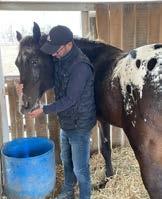
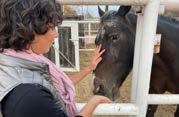
For decades, residents of Kibbutz Urim have lived under the constant threat of rocket and terror attacks from nearby Gaza, dangers that have deeply impacted the entire community. Those growing up as youngsters under this ever-present peril bear the scars of trauma. For these children, finding pathways to healing is essential.
Over recent years, the International Christian Embassy Jerusalem (ICEJ) has supported one such pathway—a therapeutic riding center at Kibbutz Urim, where we have donated horses and riding equipment and sponsored innovative therapy riding sessions for children and youth.
The use of zootherapy—where animals help people cope with emotional, psychological, and even physical challenges—has proven incredibly effective. In addition to donating therapy horses “Andy” and “Deanna” to the Kibbutz Urim riding center, our sponsorship of riding sessions for children there have already helped countless youth regain trust in others. These horses offer a unique form of therapy that promotes calmness, reduces stress, and helps children reconnect with their emotions.
The need for this type of therapy has only grown in recent years, especially following the trauma of the October 7 massacres in 2023. Currently, 96 children are enjoying horse therapy lessons at the Urim Horse Ranch, and an additional 84 children are on the waiting list.
BY NATIVIA SAMUELSEN ICEJ AID ADMINISTRATOR
In response to this growing demand, our newest donation at the Urim riding center is Marty, a four-year-old Appaloosa mix. His trainer, Oded, recently explained why Marty is such a good fit for Urim’s horse ranch.
“Besides the fact that he’s already trained for therapeutic work, he is strong but gentlenatured and not too big, which makes him perfect for working with children of all ages. His relaxed temperament helps calm nervous children,” he related. Marty has already been helping more than 15 children each week with riding lessons and outdoor treks.
Alongside the riding therapy, the Urim ranch has a new vision to restore and expand its petting zoo. This Animal Corner was once a thriving and popular place for children from throughout the Negev, but it has since become neglected and fallen out of daily use, in part because of COVID and then the war. So there is much excitement in the community to restore and expand the petting zoo to make it into a more welcoming and effective place for trauma therapy.
This vision was first set in motion by Yoel Zeigler, who founded the Animal Corner in 1970. Yoel, now 96, remains involved with caring for the few remaining animals each morning. He remembers the early days when children helped build the first enclosures out of repurposed metal boxes from the kibbutz factory.
“Nothing here costed money,” Yoel proudly stated. “We just made it work.”
Now, with the kibbutz’s new initiative to revive the Animal Corner, the next generation is stepping up to carry the torch. One kibbutz member who grew up with the animals remembers the corner in its prime.
“We dreamed that we would pass this on to our children,” he said. “Now, my son doesn’t want to leave. He wants to stay in the kibbutz and see the corner come back to life.”
The efforts to rebuild the Animal Corner are well underway, but there is still much to do. The vision is clear: a fully restored space where children can come and connect with various friendly animals and find the healing they need. With the help of Christians from around the world, this dream is sure to become a reality.
Marty’s arrival marks the beginning of this exciting new phase for Kibbutz Urim. His calming presence and gentle nature are already making a difference, but the work to restore and expand the Animal Corner is ongoing.
By connecting with animals like the ICEJ’s therapy horses Marty, Andy, and Deanna, traumatized Israeli children are learning to trust again, find calm, and heal. We hope our support for the Urim Horse Ranch and Animal Corner will allow many more youngsters to see the innocence and joy of childhood again. Join us in this effort by giving to our Israel in Crisis fund.

Bracha, who lost her husband and son during the Hamas massacres of October 7, 2023, as well as her home, admires her succulents in her new home.
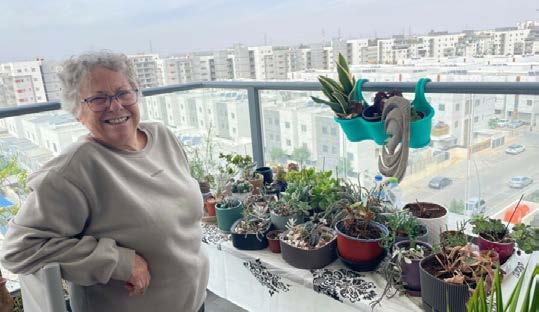
BY NATIVIA SAMUELSEN, ICEJ AID ADMINISTRATOR
My hand is outstretched not to be alone.”
This is a powerful line from a poem written by Bracha, a resident of Nir Oz, about facing the loss of her husband and a son during the Hamas massacres of October 7, 2023.
We met Bracha on a recent visit to meet displaced residents of Nir Oz residents, which lost one-quarter of its 400 residents who were either killed or kidnapped on that horrific day. She also lost her home in the fires started by the terrorists and had nothing left. But Bracha survived because she was on a trip to Egypt on October 7.
“At least now, the rest of my children still have a mother,” she said.
After being moved to new, temporary housing, she enrolled in a special trauma therapy program for 52 surviving families from Kibbutz Nir Oz in Israel with the financial support of the International Christian Embassy Jerusalem (ICEJ). The unique initiative combines practical support with trauma care.
Kibbutz Nir Oz was one of the hardest-hit Israeli communities along the Gaza border, and many hostages still held by Hamas are from that village. So their return to this small farming village and family community has yet to fully begin. But this ICEJ-sponsored project aims to assist these families who have endured unimaginable loss as they begin to heal and rebuild their lives in interim housing before finally making their way home.
Nir Oz residents are currently living in a new neighborhood a half-hour away in Kiryat Gat. Through the generosity of ICEJ USA, the 52 families who chose to join this program were awarded a grant to purchase replacement household items destroyed on October 7. Then, each was
paired with a social worker and a volunteer interior designer. These volunteers listen to their stories, understand their emotional needs, and help them select and place household items to make their new living space feel more like home. The program reminds these families that they are not alone in their recovery journey and that Christians are standing beside them.
“Our homes were warm and beautiful, but small. We are modest people. Our homes were built over the years. My house burnt completely. My husband and my son were murdered, and I felt so alone,” shared Bracha.
She welcomed us into her newly designed home, full of color and with her own, unique fingerprint. The entryway wall displayed two beautiful portraits of her husband and son that a talented friend drew. Frames with pictures of her family rested on a ledge below.
“I wanted this to be a living memory, constantly changing and creative,” shared Bracha. “And I wanted everyone who comes here [to] find their place. My grandchildren love to play with and change out the pictures when they come. This home is still being built. I’d like to put up more shelves for more pictures.
“In the beginning, the [temporary] houses felt like a cookie cutter of one another. It was terrible! Now suddenly, the homes have taken on the personality of the residents. I lost my house, but I wanted this to feel like a home. My miracle is that I wasn’t home on October 7. I have five children—four remain—and nine grandchildren.
“What I love most is color. When you come in, you feel that it is a home. I love to do planters with different succulents inside. I don’t know how to draw, but I love colors and I do intuitive drawing with color. It is a way for me to treat the trauma without medication.”
Following our visit to Bracha, we went to Gidi and Miri’s home, accompanied by community social workers. Miri is a massage therapist, and Gidi is a manager in the agricultural wing of the kibbutz. On October 7, the entire staff in the agricultural wing was murdered; only Gidi and one other coworker survived.
“Gidi’s extensive experience in agriculture meant that he was needed on the kibbutz,” said his wife, Miri. “He is always at the kibbutz, but without the community there, he feels lost. It weighs heavily on him. He didn’t have the strength to think about this, to make purchases. He had to work.”
Miri described how her husband could not stop to grieve. He had to continue for the well-being of the crops and the business. Nevertheless, going back to the offices and seeing things as they once were—though the entire staff had been murdered—was greatly challenging and has left Gidi feeling depressed and without much energy or interest in other things. It is particularly painful to visit the covered patio with its table and chairs around, where the agricultural team would sit as a “parliament” to discuss, eat lunch, or have a coffee.
On October 7, Gidi and Miri were in America visiting family. They were receiving all the horrible messages from their friends and relatives and were out of direct contact with their children for 33 terrifying hours. The experience is a trauma for them to this day.
“We came here (to Kiryat Gat) with nothing,” Miri explained. “What wasn’t robbed was destroyed or broken. It isn’t possible to touch or save anything. The Gazans who came in even took our shoes and left theirs behind.”
Soon, these families will have to say goodbye to whatever remains of their former homes. Plans are in place for the government to clear out the houses once the families have had the chance to see if anything is salvageable, and they will level everything else and rebuild from the ground up.
After hearing about the support program, Miri finally decided, despite Gidi’s lack of interest, to participate and receive some help. It still took her several months to collect the energy to try it, time interspersed with bitter news regarding the hostages and attending memorials.
“The designer gave advice and was very helpful,” she recounted. “She didn’t intervene but gave me direction. It took some time to purchase the items.”
Miri purchased beautiful furniture and even bought Gidi a recliner chair he had always dreamed of. Others come to visit and are encouraged, and now her daughter, who at first disliked the cold, temporary apartment they moved to, wants to come and stay with her parents again.
“Even when we are not home, she will come to stay here because it now feels like a home,” Miri assured, adding that her husband also now appreciates the help and interim home.
“In our visits with just a few of these displaced Nir Oz families, we were so touched to see them finding a way forward because of the generosity of our Christian friends,” said Nicole Yoder, ICEJ VP of AID & Aliyah. “For people like Bracha, who lost her husband and son, and Miri and Gidi, who survived immense trauma, the project has offered both practical help and a chance to heal emotionally. Our hope was to let these distraught families know that they are not forgotten or alone. And, listening to their stories, it seems that the message came through loud and clear.”
The program’s focus is not just on replacing what was lost but creating homes that feel like their own again. Through color, personal touches, and thoughtful design, each home reflects the unique fingerprint of its residents. We are privileged to stand alongside these precious families and are inspired by their resilience and courage.
You can support this project and others like it being sponsored by the Christian Embassy and help Israeli families recover and rebuild from the war sparked by the October 7 massacres.


By Dr. Susan Michael, ICEJ USA President
Amid the recent joyful return of several live hostages to Israel followed by the heartbreaking return of deceased ones—including an innocent mom and her two babies, abducted when they were just nine months and three years old—discussions have continued as to what to do with Gaza after the war ends. Two plans are percolating, one spearheaded by US President Donald Trump and the other by Egypt’s government.
During Israeli Prime Minister Benjamin Netanyahu’s recent visit to the White House, Trump presented his plan of what to do— sending shock waves around the world. Trump had seen the images of a group of three emaciated male hostages upon their return to Israel and perhaps emboldened him to announce in a press conference that followed that the United States would take over and rebuild Gaza.
The Arab world was outraged, while American allies were stunned but showed openness to the idea. Israel, traumatized by the horrors of October 7, 2023, and the horrific treatment of recently released hostages (and undoubtedly those still in Gaza), has generally embraced the idea. Removing the Palestinian threat and gaining a sense of security Israelis haven’t had for decades is appealing. Even Israel’s defense minister promptly ordered his military to begin preparations for their departure.
Trump’s Plan for a Restored Gaza
In Trump’s proposal, Palestinians could choose to temporarily resettle in safer, more attractive communities outside Gaza rather than returning to flattened buildings and rubble so they can restart their lives. Jordan, Egypt, and other Arab nations would accept Palestinian refugees. After the war ended, Israel would transfer control of Gaza to the United States, which would resettle the refugees and then initiate cleanup and rebuilding efforts. Notably, Trump’s plan would not require the deployment of US troops to Gaza.
Not surprisingly, Palestinians are against the plan, fearing a bait-and-switch—that Israel would never allow their return. Hamas has condemned it, claiming a US takeover would amount to an occupation. Human Rights Watch has called Trump’s plan a “forcible transfer,” prohibited in the Geneva Conventions of 1949. The International Criminal Court and Amnesty International say expelling Palestinians by force would be a war crime (Nazi leaders were charged with this in the Nuremberg trials after World War II)—even a crime against humanity. However, according to Trump, Palestinians will want to leave, seeing it as a chance for a new start.
Egypt rejected Trump’s plan to empty Gaza of its population and initiated a covert campaign to counter Trump’s. The Egyptian government claims Trump’s plan violates international law—that it could undercut ceasefire talks, shatter the existing “foundations of peace,” and threaten the nearly 50-year-old peace talks with Israel. Ultimately, Egypt contends that resettling Palestinians will destabilize the region and threaten its national security.
Egypt prefers to keep the Palestinians in Gaza, begin reconstruction efforts, and move toward the creation of a Palestinian state that includes the West Bank and east Jerusalem. Their plan would establish secure areas in Gaza for Palestinians to live while cleanup and infrastructure rehabilitation happens. Egypt has been engaged in talks with European diplomats, as well as Saudi Arabia, Qatar, and the United Arab Emirates, about their plan and how to fund it. They must convince Trump their plan is a viable alternative, a task that would require addressing the role the Palestinian Authority (PA) should have in a rebuilt Gaza (if any). It would also require unity among Arab nations, which has historically been weak.
Both plans must figure out what to do with the more than 2 million Palestinians who have no home to return to. In Trump’s mind, Jordan, Egypt, and other Arab nations would accept Palestinian refugees. However, these countries don’t want them—they know even Gazan civilians are complicit in what happened on October 7, 2023, and that many are radicalized and dangerous. Palestinian refugees could very well bring the radical jihadist movement into their countries.
However, leaving them in Gaza, as Egypt is scheming, lays the foundation for future problems there. Hamas will only regroup and train up a new generation of fighters. And moving refugees to designated places within Gaza is impractical, assuming many years of cleanup and construction are ahead that will inhibit regular life.
Egypt’s plan involves the same old end goal of an independent Palestinian state. But Israel has repeatedly offered this to the Palestinians, exchanging land for peace—even aiding them so they could succeed. Gaza was actually a test of the “two-state solution,” and look at what it produced: a jihadist terrorist organization seeking to take over all of Israel and murdering every Jew in their way.
The barbarism of the October 7, 2023, attack revealed the true evil undergirding Hamas. It is clear Israel has no choice but to eliminate Hamas altogether if it wants lasting peace. Allowing Palestinians to emigrate on their own is the most humane option, but other countries must be willing to take them in and reeducate and deradicalize them. This is the only way to bring peace to Gaza.
For this reason, Trump’s plan is the only viable one on the table—and is why Netanyahu looked a bit lighter when Trump presented it to the world.

for your family, church, or Bible study group this year!
Celebrating Passover brings a deeper understanding of the exodus and its significance for Christians today. The ICEJ team can lead your group through all parts of the meal or assist you in hosting your own using our beautiful, new ICEJ Passover seder booklet that will walk you through every step.
